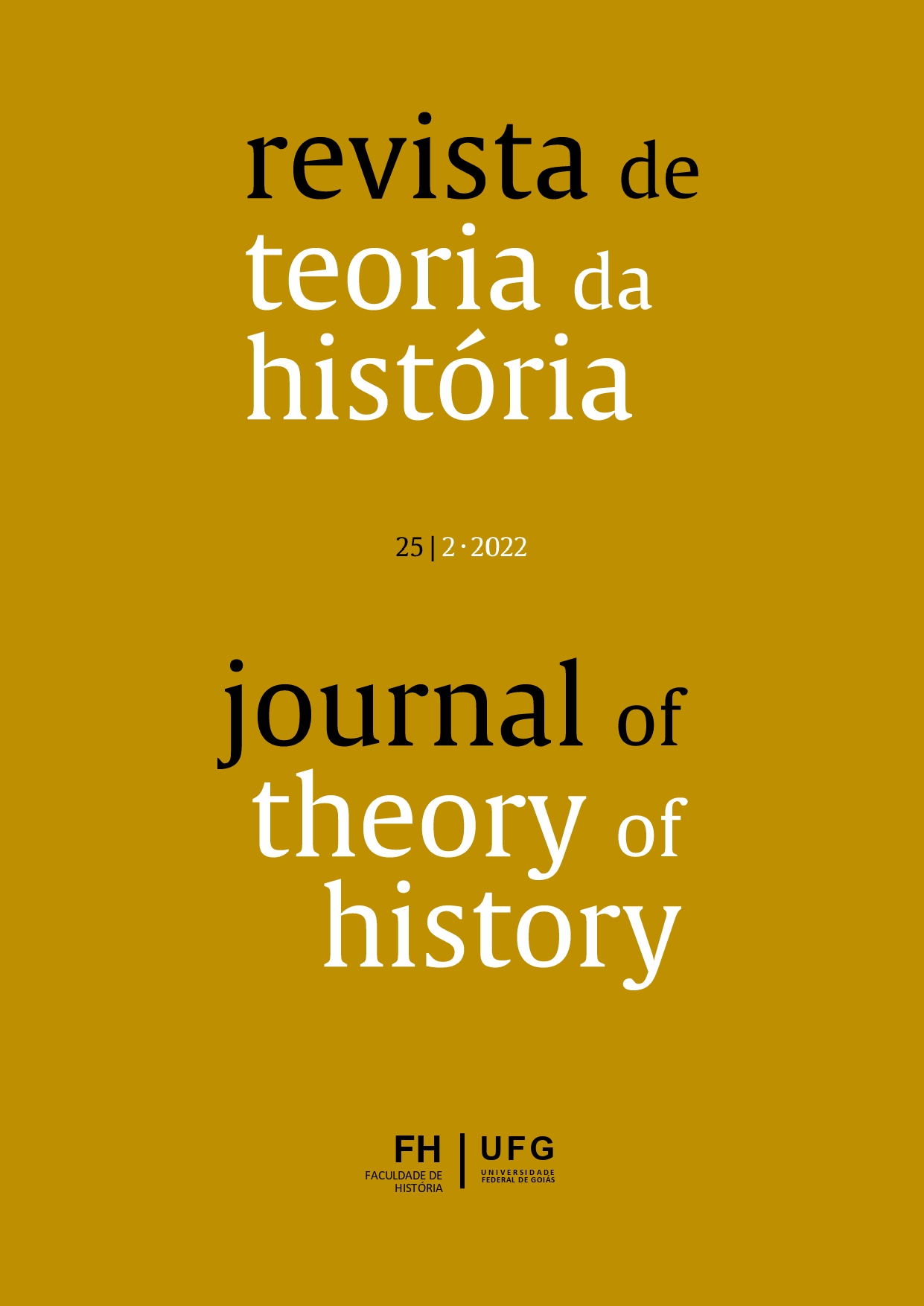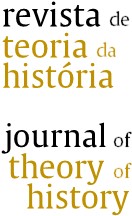Quentin Skinner and the History of Political Ideas
DOI:
https://doi.org/10.5216/rth.v25i2.72044Keywords:
Political Ideas, History of concepts, MethodologyAbstract
The purpose of this article is to make a critical balance of Quentin Skinner's methodological proposal based on linguistic context to interpret political writings from the past. At first, the justifications and characteristics of the proposed methodology are presented, whose main guideline is to reconstitute the discursive context in which the text is inscribed, the linguistic conventions that govern the treatment of the topics covered and the author's intention when writing it. Then, the main objections to Skinner's linguistic context and the responses given to his critics are analysed. Finally, the relevance of the proposed methodology for understanding the political ideas of authors from the past is discussed.
References
AUSTIN, John. How to Do Things with Words. Oxford: Oxford University Press, 1962.
BARROS, Alberto. Quentin Skinner e a liberdade republicana em Maquiavel. Discurso, v.45, p.187 – 206, 2015.
BERLIN, Isaiah. Two Concepts of Liberty. In: BERLIN, Isaiah. Four Essay on Liberty. Oxford: Oxford University Press, 1969. p. 118-172.
BEVIR, Mark. The Errors of Linguistic Contextualism. History and Theory, v. 31, p. 267-98, 1992.
BOUCHE, David. Texts in Context: Revisionist Methods for Studying the History of Ideas. Dordrecht: Martius Nijhoff, 1985.
COLLINGWOOD, Robin. A Ideia de História. Lisboa: Editorial Presença, 1981.
DUNN, John. The Identity of the History of Ideas. Philosophy, v. XLIII, n. 134, p. 85-104, 1968.
FEMIA, Joseph. An Historicist Critique of ‘Revisionist’ Methods for Studying of Ideas. In: TULLY, John (ed). Meaning and Context: Quentin Skinner and his Critics. Cambridge: Cambridge University Press, 1988. p. 156-175.
FERES Jr., João. De Cambridge para o Mundo, Historicamente: Revendo a Contribuição Metodológica de Quentin Skinner. Dados: Revista de Ciências Sociais, v. 48, n. 3, p. 655-680, 2005.
GAUTIER, Claude. Texte, contexte et intention illocutoire de l’auteur. Revue de métaphysique et de morale, n.42, p. 175-192, 2004.
GRAFTON, Anthony. The History of Ideas: Precept and Practice. Journal of the History of Ideas, v. 67, n. 1, p. 1-32, 2006.
GRAHAM, Keith. How do Illocutionary Descriptions Explain? In: TULLY, John (ed). Meaning and Context: Quentin Skinner and his Critics. Cambridge: Cambridge University Press, 1988. p. 147-155.
GUNNELL, John. Interpretation and the History of Political Theory: Apology and Epistemology. American Political Science Review, v. 76, p. 317-327, 1982.
HARLAN, David. Intellectual History and the Return of Literature. The American Historical Review, v. 94, n.3, p. 581-609, 1989.
HOLLIS, Martin. Say it with Flowers. In: TULLY, John (ed). Meaning and Context: Quentin Skinner and his Critics. Cambridge: Cambridge University Press, 1988. p. 135-146.
JASMIN, Marcelo. História dos Conceitos e Teoria Política e Social: referências preliminares. Revista Brasileira de Ciências Sociais, v. 20, n. 57, p. 27-38, 2005.
JAUME, Lucien. De la Philosophie Politique et de son usage dans L’Histoire des Idées Politiques. Le Banquet, v. 1, n. 17, p.1-7, 2002.
KEANE, John. More Theses on the Philosophy of History. In: TULLY, John (ed). Meaning and Context: Quentin Skinner and his Critics. Cambridge: Cambridge University Press, 1988. p. 204-217.
KOSELLECK, R. Futuro passado: contribuição à semântica dos tempos históricos. Rio de Janeiro: Contraponto, 2006.
LAMB, Robert. Quentin Skinner’s revised historical contextualism: a critique. History of the Human Sciences, v. 22, p. 51-73, 2009.
LANE, Melissa. Doing Our Own Thinking for Ourselves: On Quentin Skinner’s Genealogical Turn. Journal of the History of Ideas, v.73, n.1, p. 71-82, 2012.
LESLIE, M. In Defense of Anachronism. Political Studies, v.18, p. 433–47, 1970.
LOCYER, Andrew. Traditions as Context in the History or Political Thought. Political Studies, v. 2, p. 201-217, 1979.
LOVEJOY, Arthur. The Great Chain of Being: A Study of the History of an Idea. Cambridge (USA): Harvard University Press, 1936.
LOVEJOY, Arthur. The Historiography of Ideas. Proceedings of the American Philosophical Society, v. 78, n. 4, p. 529-543, 1938.
MINOGUE, Kenneth. Method in Intellectual History: Quentin Skinner’s Foundations. In: TULLY, John (ed). Meaning and Context: Quentin Skinner and his Critics. Cambridge: Cambridge University Press, 1988. p. 176-193.
MULLIGAN, Lotte. Intentions and Conventions: a critique of Quentin Skinner’s method for the study of the history of ideas. Political Studies, v. 27, p.84-98, 1979.
PALONEN, Kari. The history of concepts as a style of political theorizing: Quentin Skinner and Reinhart Koselleck’s subversion of normative political theory. European Journal of Political Theory, v.1, n. 1, p. 91-106, 2002.
PALTI, Elias. From Ideas to Concepts to Metaphors: The German Tradition of Intellectual History and the Complex Fabric of Language. History and Theory, v. 49, p. 194-211, 2010.
PALTI, Elias. The ‘Theoretical Revolution’ in Intellectual History: from the History of Political Ideas to the History of Political Languages. History and Theory, v.53, p. 387-405, 2014.
PAREKH, Bhikhu; Berki, Robert Nando. History of Political Ideas: A Critique of Q. Skinner’s Methodology. Journal of the History of ideas, vol. 34, p. 163-84, 1973.
PERREAU-SAUSSINE, Émile. Quentin Skinner in Context. The Review of Politics. v. 69, n.1, p. 106-122, 2007.
POCOCK, John. Quentin Skinner: the history of politics and the politics of history. Common Knowledge, v. 10, n. 3, p. 532-550, 2004.
POCOCK, John. The history of political thought: a methodological inquiry. In: POCOCK, John. Political Thought and History: Essays on Theory and Method. Cambridge: Cambridge University Press, 2008. p. 3-19.
RICOUER, Paul. The Model of the Text: Meaningful Action Considered as a Text. New Literary History, v. 5, n. 1, p. 91 – 117, 1973.
ROGERS, Melvin L. Republican confusion and liberal clarification. Philosophy and Social Criticism, v.34, n.7, p. 799-782, 2008.
RORTY, Richard (org). The Linguistic Turn: Recent Essays in Philosophical Method. Chicago: University of Chicago Press, 1967.
SEIDMAN, Steven. Beyond Presentism and Historicism: Understanding the History of Social Sciences. Sociological Inquiry, v. 53, n. 1, p. 77-94, 1983.
SHAPIRO, Ian. Realism in the Study of the History of Ideas. History of Political Thought, v. 3, p. 535-578, 1982.
SILVA, Ricardo. História Intelectual e Teoria Política. Revista de Sociologia e Política, v. 17, n. 34, p. 301-318, 2009.
SILVA, Ricardo. O Contextualismo Linguístico na História do Pensamento Político: Quentin Skinner e o Debate Metodológico Contemporâneo. Dados: Revista de Ciências Sociais, v. 53, n. 2, p. 299-335, 2010.
SILVA, Ricardo. Da história do pensamento político à teoria política histórica: variações da hermenêutica do conflito de Quentin Skinner. Lua Nova, n.102, p. 137-171, 2017.
SKINNER, Quentin. The Limits of Historical Explanations. The Royal Institute of Philosophy, v. 41, n. 157, p. 199-215, 1966.
SKINNER, Quentin. Meaning and understanding in the history of ideas. History and Theory, v. 8, n. 3, p. 3-53,1969.
SKINNER, Quentin. Conventions and the Understanding of Speech Acts. The Philosophical Quarterly, v. 20, n. 79, p. 118-138, 1970.
SKINNER, Quentin. On performing and explaining linguistic actions. The Philosophical Quarterly, vol. 21, n. 82, p. 1-21, 1971.
SKINNER, Quentin. Motives, Intentions and the Interpretations of Texts. New Literary History, n.3, p. 393-408, 1972a.
SKINNER, Quentin. Social meaning and the explanation of social action. In LASLETT, Peter (ed). Philosophy, Politics and Society. Oxford: Oxford University Press, 1972b. p. 136-157.
SKINNER, Quentin. Some Problems in the Analysis of Political Thought and Action. Political Theory, n. 2, p. 277-303, 1974.
SKINNER, Quentin. Action and context. Proceedings of the Aristotelian Society, v. 52, p. 57-69, 1978.
SKINNER, Quentin. The idea of cultural lexicon. Essays in Criticism, n. 29, p. 205-224, 1979.
SKINNER, Quentin. Machiavelli on the Maintenance of Liberty. Politcs, v.18, n.2, p.3-15, 1983.
SKINNER, Quentin. The idea of negative liberty: philosophical and historical perspectives. In: RORTY, R (ed). Philosophy in History. Cambridge: Cambridge University Press, 1984a. p.193-221.
SKINNER, Quentin. Paradoxes of Political Liberty. The Tanner Lectures on Human Values, p. 227-250, 1984b.
SKINNER, Quentin. A reply to my critics. In: TULLY, John (ed). Meaning and Context: Quentin Skinner and his Critics. Cambridge: Cambridge University Press, 1988. p. 231-288.
SKINNER, Quentin. The republican ideal of political liberty. In: Bock, Gisela (ed.) Machiavelli and Republicanism. Cambridge: Cambridge University Press, 1990a. p. 293-309.
SKINNER, Quentin. Thomas Hobbes and the Proper Signification of Liberty. Transactions of the Royal Historical Society, v. 40, p.121-151,1990b.
SKINNER, Quentin. Liberdade antes do liberalismo. São Paulo: Editora Unesp, 1998.
SKINNER, Quentin. Rhetoric and Conceptual Change. Finnish Yearbook of Political Thought, v. 3, p. 60-73, 1999.
SKINNER, Quentin. Visions of Politics I: Regarding Method. Cambridge: Cambridge University Press, 2002a.
SKINNER, Quentin. A Third Concept of Liberty. The British Academy's inaugural Isaiah Berlin Lecture. Prodeedings of the Bristish Academy, n.117, p.237-268, 2002b.
SKINNER, Quentin. From Humanism to Hobbes: Studies in Rhetoric and Politics. Cambridge: Cambridge University Press, 2018.
SCHOCHET, Gordon. Quentin Skinner’s Method. Political Theory, v. 2, n. 3, p. 261-76, 1974.
TARLTON, C. D. Historicity, Meaning and Revisionism in the Study of Political Thought. History and Theory, v. 12, p. 309-28, 1973.
TERCHEK, R. Republican Paradoxes and Liberal Anxieties. London: Rowman& Littlefield Publishers, Inc. 1997.
WITTGENSTEIN, Ludwig. Investigações Filosóficas. São Paulo: Martins Fontes, 1994.
Downloads
Published
How to Cite
Issue
Section
License
Copyright (c) 2023 rth |

This work is licensed under a Creative Commons Attribution-NonCommercial-NoDerivatives 4.0 International License.
The journal publishes only and exclusively original manuscripts. All rights reserved.
Licensed under a Creative Commons Attribution-NonCommercial-NoDerivatives 4.0 International License



